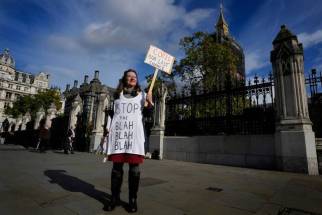Crisis demands more than pronouncements
Read this article for free:
or
Already have an account? Log in here »
To continue reading, please subscribe:
Monthly Digital Subscription
$0 for the first 4 weeks*
- Enjoy unlimited reading on winnipegfreepress.com
- Read the E-Edition, our digital replica newspaper
- Access News Break, our award-winning app
- Play interactive puzzles
*No charge for 4 weeks then price increases to the regular rate of $19.00 plus GST every four weeks. Offer available to new and qualified returning subscribers only. Cancel any time.
Monthly Digital Subscription
$4.75/week*
- Enjoy unlimited reading on winnipegfreepress.com
- Read the E-Edition, our digital replica newspaper
- Access News Break, our award-winning app
- Play interactive puzzles
*Billed as $19 plus GST every four weeks. Cancel any time.
To continue reading, please subscribe:
Add Free Press access to your Brandon Sun subscription for only an additional
$1 for the first 4 weeks*
*Your next subscription payment will increase by $1.00 and you will be charged $16.99 plus GST for four weeks. After four weeks, your payment will increase to $23.99 plus GST every four weeks.
Read unlimited articles for free today:
or
Already have an account? Log in here »
Hey there, time traveller!
This article was published 27/10/2021 (1505 days ago), so information in it may no longer be current.
Seldom has a meeting mattered more. And yet, if past United Nations climate summits are any indication, COP26 is poised to include a lot of lofty talk and very little tangible environmental action.
For two weeks, beginning Sunday, delegates from 197 parties will convene in Glasgow to hammer out plans for curbing greenhouse-gas emissions, achieving carbon-neutral economies and keeping global warming below 1.5 C — the scientifically agreed upon threshold for keeping the most extreme consequences of the climate emergency at bay.
If those goalposts are inducing déjà vu, it’s because we’ve been here before. Many times over.
The UN has been hosting climate conferences annually since 1995, and global leaders have been making aspirational pledges for the last 25 years.
The Kyoto Protocol, adopted in 1997 and enacted in 2005, was the first legally binding international climate treaty. While most of the 36 participating countries were able to moderately reduce emissions, many did so with carbon credits and as a result of financial recessions. China and the United States never signed, and Canada dropped out. Since 1990, global carbon dioxide emissions have increased by more than 50 per cent.
The Paris Agreement followed in 2015, with a wider scope and significantly more buy-in. Nearly all UN climate convention members signed on to reduce their carbon output and keep long-term temperature increases in check. But there are no sanctions for countries that don’t meet the targets.
What, might we collectively ask, is the point? The consequences of political inaction are becoming distressingly clear. Around the globe, major floods, tropical storms and record-breaking heat waves are making headlines on a near-weekly basis. Extreme weather events such as these are made more severe and frequent as a result of climate change.
Disasters have become the norm, and our world leaders have failed to treat global warming like the disaster it is. Humanity deserves action, and quickly.
The COP26 summit is the first major check-in since the creation of the Paris Agreement, and it should serve as a reminder that our current targets still aren’t sufficiently aggressive. A New York Times projection shows that while progress is happening thanks to rapid growth in clean energy, current policies have us on track to hit 3 C of warming by 2100.
Fossil-fuel production also isn’t waning as quickly as it needs to, according to a new UN report.
Countries have nine years to make a real difference, and ahead of COP26, many nations have committed to further emission cuts– which is all well and fine if there is immediate follow-through.
Countries have nine years to make a real difference, and ahead of COP26, many nations have committed to further emission cuts — which is all well and fine if there is immediate follow-through. Based on past experience, that’s unlikely.
Global consensus on climate change as a pressing issue is important, and the upcoming summit presents an opportunity to collaborate on common goals. That said, we shouldn’t be putting all our eggs in one basket.
Municipalities, private companies and organizations also have a role to play in cutting carbon, and smaller sector-by-sector changes can add up to make a difference. New technology, green energy and sound urban planning are key to shifting away from fossil fuels and reducing our collective carbon footprint. We don’t have to pin the success of our future on the lackluster global treaties of the past.
Elected officials and global agreements aren’t the only answer to fighting climate change, but they do need to be part of the solution. Let’s hope our leaders return from Glasgow ready to do the work.










